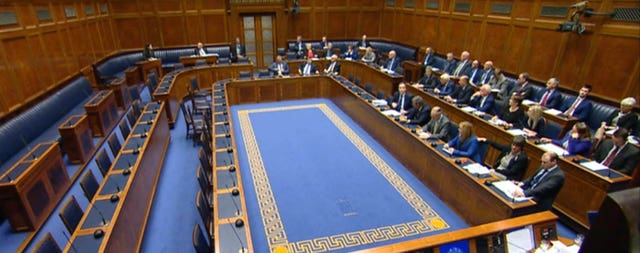
Abortion has been decriminalised in Northern Ireland after a landmark law change came into force at midnight.
The legal reforms voted in at Westminster have also paved the way for the introduction of same-sex marriage in the region, with the first weddings expected in February.
The Northern Ireland (Executive Formation etc) Act 2019 also includes provisions for a new pension paid to injured victims of the Troubles.
The Act was ostensibly designed by the Government to provide the legal framework for under-pressure civil servants to continue running public services in the region in the ongoing absence of powersharing.
 A PinkNews LGBT event at Parliament Buildings, Stormont (Brian Lawless/PA)
A PinkNews LGBT event at Parliament Buildings, Stormont (Brian Lawless/PA)
However, during its passage through Parliament in the summer, opposition MPs bolted on amendments to the law to bring about the historic abortion and marriage reforms.
The only way the law changes could have been halted ahead of the midnight deadline was if a new devolved executive had been in place before then.
That was also going to be a long shot.
More than 1,000 days since powersharing imploded amid a row over a botched green energy scheme, recent months saw limited progress in efforts to resolve the raft of issues still preventing the DUP and Sinn Fein re-entering government together.
The Assembly did sit for the first time in over two and half years on Monday, after DUP members and several other anti-abortion unionists signed a recall petition to reconvene proceedings.
 The debating chamber at Stormont (NI Assembly TV/PA)
The debating chamber at Stormont (NI Assembly TV/PA)
However, the members were unable to influence the law changes as the Assembly could not function properly in the absence of a ministerial executive.
The DUP’s attempt to table legislation to halt the abortion reform fell at the first hurdle after outgoing speaker Robin Newton ruled that the bill could not be considered until a new speaker was elected – an appointment that was impossible without nationalist approval.
Sinn Fein boycotted proceedings while the SDLP walked out after making clear it would not participate in the election of a speaker.
DUP leader Arlene Foster has vowed to explore legal options to stop the liberalisation of abortion in the region.
My letter to the Attorney General and the response. Today was a missed opportunity to protect life. Thank you to those MLAs that took their seats and supported this initiative. The fight for the most important right of all the right to life will go on! pic.twitter.com/0Exp9Xo3u8
— Paul Givan (@paulgivan) October 21, 2019
However, Sinn Fein leader Mary Lou McDonald welcome the law changes, branding the DUP’s behaviour in the Assembly chamber a stunt.
Northern Ireland had the strictest abortion regime in the UK or Ireland, with terminations only permitted if the mother’s life was in danger or there was a serious risk to her physical or mental health.
Now the 19th-century laws that criminalised abortion have fallen away, the Government has assumed responsibility for introducing new regulations to provide greater access to terminations in the region by next April.
The Northern Ireland Office will consult on the shape and remit of the new services.
DUP assembly stunt 'pointless' – @moneillsf https://t.co/hzZcrdBtsu pic.twitter.com/bjjQeQL4JH
— Sinn Féin (@sinnfeinireland) October 21, 2019
In the interim period, women will be offered free transport to access abortion services in England.
Under the Act, the Government is also obliged to make regulations to extend same-sex marriage to Northern Ireland by January 13.
Taking account of a required notification period engaged couples must observe, the first weddings are anticipated around Valentine’s Day in February.
The Government is also required to make regulations to introduce a victims pension scheme in Northern Ireland by the end of January, to be in operation by the end of May.


Why are you making commenting on The Herald only available to subscribers?
It should have been a safe space for informed debate, somewhere for readers to discuss issues around the biggest stories of the day, but all too often the below the line comments on most websites have become bogged down by off-topic discussions and abuse.
heraldscotland.com is tackling this problem by allowing only subscribers to comment.
We are doing this to improve the experience for our loyal readers and we believe it will reduce the ability of trolls and troublemakers, who occasionally find their way onto our site, to abuse our journalists and readers. We also hope it will help the comments section fulfil its promise as a part of Scotland's conversation with itself.
We are lucky at The Herald. We are read by an informed, educated readership who can add their knowledge and insights to our stories.
That is invaluable.
We are making the subscriber-only change to support our valued readers, who tell us they don't want the site cluttered up with irrelevant comments, untruths and abuse.
In the past, the journalist’s job was to collect and distribute information to the audience. Technology means that readers can shape a discussion. We look forward to hearing from you on heraldscotland.com
Comments & Moderation
Readers’ comments: You are personally liable for the content of any comments you upload to this website, so please act responsibly. We do not pre-moderate or monitor readers’ comments appearing on our websites, but we do post-moderate in response to complaints we receive or otherwise when a potential problem comes to our attention. You can make a complaint by using the ‘report this post’ link . We may then apply our discretion under the user terms to amend or delete comments.
Post moderation is undertaken full-time 9am-6pm on weekdays, and on a part-time basis outwith those hours.
Read the rules hereLast Updated:
Report this comment Cancel